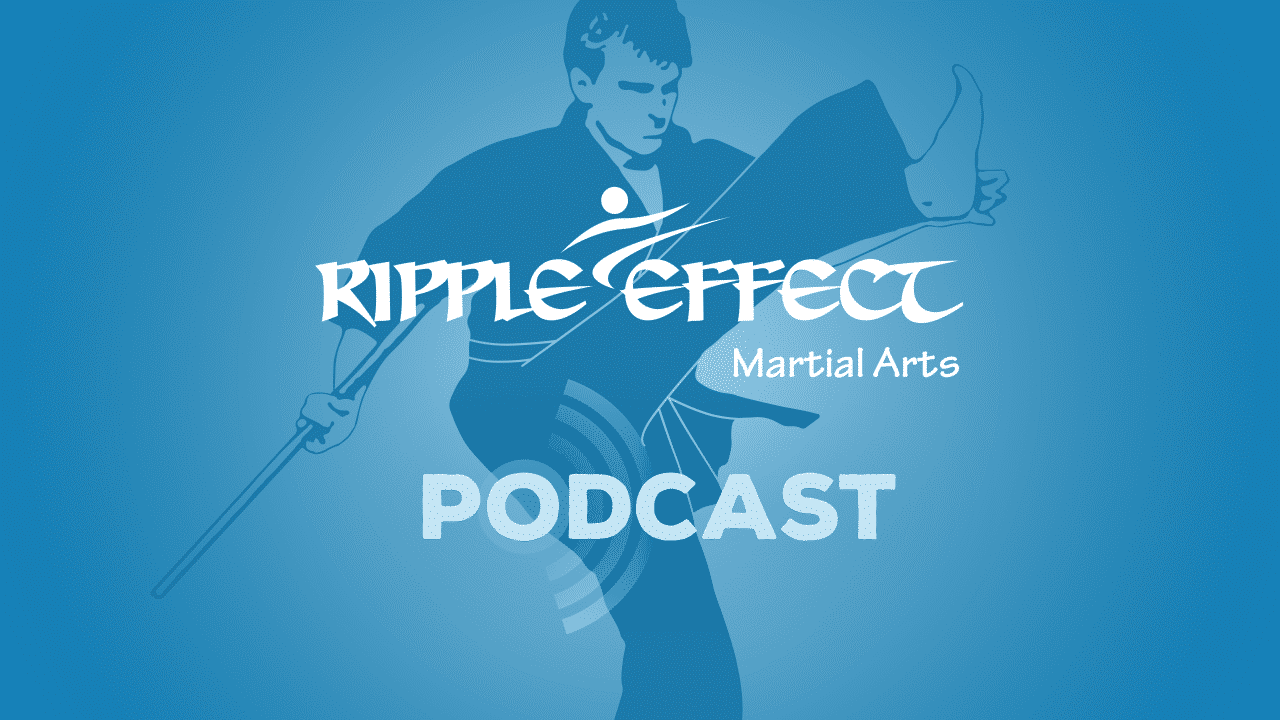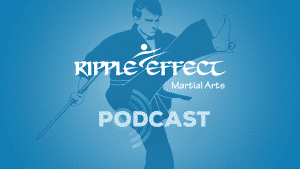What brought you to Ripple Effect Martial Arts?
I have two boys, and when they were younger (3 and 4 years old) they tried karate out in California, but it didn’t stick.
My youngest wanted to be a Power Ranger, and he thought taekwondo was the ticket. We spun a wheel at a festival and won a free week of classes at Ripple Effect Martial Arts, and he started up and loved it. Then about a year later I finally joined. I just thought, this is fun. I like kicking things. My older boy and my husband earned their white belts after that.
You just had your first 3-day black belt test with your youngest son last fall. What was the experience like in the Covid era?
It was something I’d looked forward to, having seen many black belt tests up in Estes Park (Colorado). The test last fall was different, obviously, because of the pandemic. But we’ve made some great friends. And the experience was enhanced for us by doing it together, me and my son. We cheer each other on.
My older son looked on wide-eyed, looking forward to what he can expect [during his own black belt test] this year.
You work as a school psychologist, so you must deal with a lot of behavioral issues. Does karate training go hand in hand with that?
The first year seeing my two sons on the mat, I would geek out seeing all the executive function skills that kids were being taught in the karate school. Goal setting, for example. They’re working toward a goal of black belt, which is four years out. And my youngest son is six years old, and he’s working toward a goal that’s more than half his life away. But it’s broken down in a way that’s achievable.
We don’t usually teach kids that way, but most people need to learn that way. Social skills, too. Like how to do a decent handshake that gives a positive impression. I teach that in my job in elementary schools, teaching kids how to introduce themselves or shake someone’s hand. This can take an entire half hour session, or more. And Ripple Effect builds it into the curriculum.
That positive reinforcement of desired behaviors is huge to the development of kids. The instructors being role models is huge too, by teaching respect. There are the 40-year-old moms and dads that don’t know anything [laughs], and then these cool 20 somethings that are telling my kids to make their beds and do their homework. It works.
What fascinates you about martial arts?
I think I’ve found my sport. That physical and mental control is a huge draw for me. I’m really competitive, and competing on the CKA [Colorado Karate Association] stage is really motivating. It kept my drive up, and when I didn’t win, I worked twice as hard.
For me, taekwondo is a great self regulator. If I’m having a hard day, I say “kids, we’re going to taekwondo. Momma needs to kick things.” And I’ll be in a much better mood at the end of it.
Is there a creative element to martial arts for you?
At the competition level, I think there is. In training, you need the rigidity. You have to have every stance, every chamber correct. But in competition, there’s a chance to put your own stamp on your moves, to add a little flare.
Every combination has a story for me. My boys know that. For example, the green belt combinations are all about water slides.
Explain that.
Well, all the green combos have three kicks, and they all have turns or slides. I picture them all as a water slide. It’s how I remember each one.
The boys remember them that way too. I’ll often blurt out: Blue belt number two, front punch, lunge punch: that’s “black and blue.” Purple belt number three: that’s “I’m a little T.”
Does metaphor, analogy, those pneumonic or visual devices help kids remember their karate lessons?
My kids, that’s how they know the curriculum. I work with kids in schools with learning differences who find it challenging to learn and memorize. Making it kinetic, making it rhyme, making it visual and auditory really helps kids learn. That applies to elementary school and karate.
Early on, I realized we could be tested at random. So my boys and I started using apps to randomize our practice, making sure we knew all the belt level combos and forms backwards and forwards. My kids are young. My brain isn’t as flexible, so I’d better get learning [laughs].
Teaching helps solidify your understanding. It’s true of everything. I’m amazed at how much teaching of executive functions happens in the karate school.
Can you explain what executive function means?
Essentially, executive function is your inner traffic cop. It tells you when to tune in to what’s going on. It’s that inner organizer.
Some people have a very good inner organizer. They look at a task and know exactly where to go, others look at a task don’t know where to begin. Many times, my job with students is just to teach the skills of “reading the room.” Some kids are calm and sitting at their desk, others are climbing the walls. Karate teaches kids body control, awareness.
It also applies to sparring. How do I throw a punch fast, with power, but not hurt the other person? Not because I don’t have the strength to do it, but because I can exercise the control. This applies to social skills too, learning how to read those cues of are people laughing at me, or with me? Did I get the point because I got the head strike? Or did I lose the point because my head strike was too hard?
Martial arts makes those skills feel like a secondary thing, so kids don’t even notice that they’re being taught these skills. It’s natural, organic. It inspires kids’ motivation to follow through.
Assertion isn’t everyone’s strong suit. Does martial arts teach kids how to assert themselves?
Martial arts teaches you how to stand up for yourself in a way that is heard, and hears others. I work with veteran teachers and I remind them to give five, sometimes fifteen positives to every correction for kids. Because once kids start getting that loop in their heads of “I’m bad, I’m obnoxious”… It’s hard to get out of that.
In the leadership program at karate, the instructors give praise before the correction. It’s feedback to kids about how to exercise self control.
My younger son’s focus and confidence has grown so much through the karate program. His ability to reach a goal, and trust that he can reach that goal, has really grown.
Integrity is a high concept. How do you teach it to kids?
I don’t know that you can really teach the level of pride in achievement like you can through martial arts. Recently, my older son chose to hand over his belt, because he wasn’t showing—and he knew that he wasn’t showing—appropriate self-control. And he told Ms. Hayes “I will earn this back.” And he did.
And that belt means so much more to him now than it ever did. I don’t know that he would have the integrity to hand over his belt and earn it back, something very important to him, without martial arts.
Does that early black belt training give an edge to kids’ success later in life?
It absolutely can. It can be huge. It depends on commitment, from kids and parents. They’re given a chance very young to be mentors and leaders. The lack of leadership roles is why so many teens get into trouble. Martial arts provides a role for kids to be leaders, to take on goals and massive responsibility.
Martial arts gives this very clear path so kids see the importance of their role, and they take it very seriously. It can change the direction of their life. I’ve seen them put it into their job and college applications about how black belt training has helped them grow.
What do you expect from your black belt? What will you go on to do?
I tore my ACL a year ago, and I’ve worked really hard to get back into training. Martial arts is a central part of my life and my self care. Nothing like a good scream in the middle of the day, with the excuse that it’s a KIA! in the middle of a form [laughs].


